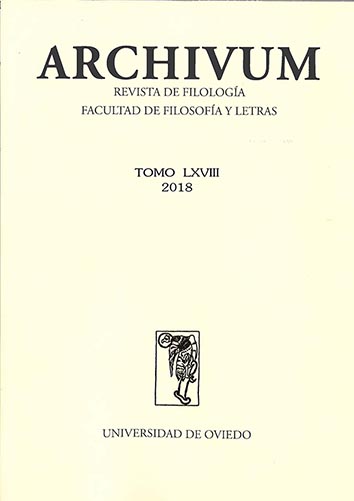Resumen
Quentin Tarantino is a controversial figure, whose trademark use of offensive language and explicit violence have, in particular, been subject to censure. A source of consternation for his detractors is the constant use of the N-word. In this article, I offer a detailed examination of the use of the N-word by white people in a broad range of discursive contexts. I begin with a quantitative analysis in the eight films directed by Tarantino –Reservoir Dogs (1992), Pulp Fiction (1994), Jackie Brown (1997), Four Rooms (1995), Kill Bill (vol. I & II) (2003 & 2004), Death Proof (2007), Inglorious Basterds (2009), and Django Unchained(2013) – followed by choice phrases extracted from those films in which the presence of the N-word is most palpable.
Citas
Allan, K. and Burridge, K. (1991): Euphemism and Dysphemism, New York/Oxford, Oxford University Press.
— (2006): Forbidden Words: Taboo and the Censoring of Language, Cambridge, Cambridge University Press.
Anon. (1998): ‘I, Quentin’ published in Mail&Guardian, http://mg.co.za/article/1998-05-01-i-quentin. Accessed 14 January 2013.
Butler, J. (1997): Excitable Speech: A Politics of the Performative, New York: Routledge.
Battistella, E. L. (2005): Bad Language. Are Some Words Better than Others? Oxford, Oxford University Press.
Dyer, R. (1997): White: Essays on Race and Culture, New York: Routledge.
Gove, P.P. and Woolf, B. (1985): Webster’s Seventh New College Dictionary, Merriam-Webster.
Green, J. (1996): Words Apart: The Language of Prejudice, London, Kyle Cathie LTD.
Green, S. (2013): ‘The Musical Routes of the Spanish Black Atlantic: The Performance of Identities in the Rap of Frank T and El Chojín, Popular Music and Society, 36: 4, pp. 505-522.
Grogan, S. C. (2011): ‘The ‘N-Word:’ The Use and Development of the Term ‘Nigger’ in African-American Culture, as Depicted in the Plays of August Wilson’. Vol. 3 No. 01 | pg. 3/3, http://www.studentpulse.com/articles/357/3/the-n-word-the-use-and-development-of-the-term-nigger-in-african-american-culture-as-depicted-in-the-plays-of-august-wilson]. Accessed 12 January 2013.
Hall, S. (1991): ‘Old and New identities, Old and New Ethnicities’, Culture, Globalization and the World-System: Contemporary Conditions for the Representation of Identity, (ed. Anthony D. King), London: Macmillan, pp. 41-68.
James, N. (2008): Sight and Sound, February number ‘Tarantino Bites Back’. Accessed 26 March 2012.
Jay, T. (1992): Cursing in America, Philadelphia/Amsterdam, John Benjamin’s Publishing Company.
Kennedy, R. L . (1999-2000): ‘Who Can Say ‘Nigger’? And Other Considerations, The Journal of Blacks in Higher Education, No.26, pp. 86-96. JSTOR. Accessed 27 March 2010.
Mars-Jones, A. (2013): ‘Django Unchained: tackling Lincoln-era America on film’. The Guardian, http://www.guardian.co.uk/film/2013/jan/25/django-unchained-lincoln-tarantino-spielberg. Accessed 25 January 2013.
Merida, K. (1998): ‘Spike Lee, Holding Court: the Director Talks Movies, Hollywood, Basketball, and, Oh, Yes, Controversy’, Washington Post, May 1.
Peary, G. (1998): Quentin Tarantino Interviews, Mississippi: University Press of Mississippi.
Phillips, S. C. (2011): ‘Roll Away the Bowdler: Examining the Bowdlerization of The Adventures of Huckleberry Finn’, Unpublished material.
Reyes-Torres, A. (2008): Walter Mosley's Detective Novels: The Creation of a Black Subjectivity, Valencia, Publicacions de la Universitat de València.
Soler Pardo, B. (2015): On the Translation of Swearing into Spanish: Quentin Tarantino from Reservoir Dogs to Inglourious Basterds, Newcastle upon Tyne: Cambridge Scholars Publishing.
Spivak, G.Ch. (1994): ‘Can the Subaltern Speak?’ Ed. Williams, Patrick and Laura Chrisman. Colonial Discourse and Post-Colonial Theory: A Reader, Hertfordshire, Harvester Wheatsheaf.
Filmography
Reservoir Dogs (1992) D: Quentin Tarantino. P: Lawrence Bender, Harvey Keitel. SC: Q. Tarantino, Roger Avary. Du: 102’ Live Entertainment.
Pulp Fiction (1994) D: Quentin Tarantino. P: Lawrence Bender. SC: Q. Tarantino, Roger Avary. Du: 154’. Miramax Films.
Four Rooms: The Man from Hollywood (1995). D: Quentin Tarantino. P: Lawrence Bender, Heidi Vogel, Paul Hellerman, Scott Lambert. SC: Q. Tarantino. Du: 97’ (whole film) Color. A Band Apart-Miramax.
Jackie Brown (1997). D: Quentin Tarantino. P: Lawrence Bender, Paul Hellerman. SC: Q. Tarantino (adapted from Elmore Leonard’s novel Rum Punch). Du: 151’. Color. Lawrence Bender Productions-A Band Apart-Miramax- Mighty Afrodite Productions.
Kill Bill vol. 1 (2003) D: Quentin Tarantino. P: Lawrence Bender. SC: Q. Tarantino. Du: 111’. A Band Apart-Miramax.
Kill Bill vol. 2 (2004) D: Quentin Tarantino. P: Lawrence Bender. SC: Q. Tarantino. Du: 136’. A Band Apart-Miramax.
Grindhouse: Death Proof (2007) D: Quentin Tarantino. P: Elizabeth Avellan, Robert Rodríguez, Erica Steinberg and Quentin Tarantino. SC: Q. Ta
Tarantino. Du: 95’. The Weinstein Company.
Inglorious Basterds (2009). D: Quentin Tarantino. P: A Band Apart-A Zehnte Babelsberg Film GmbH. SC: Q. Tarantino. Du: 146’. Universal-The Weinstein Company.
Django Unchained (2012). D: Quentin Tarantino. P: A Band Apart. SC: Quentin Tarantino. Du: 165’. P: Sony Pictures/The Weinstein Company.
Internet Sources

